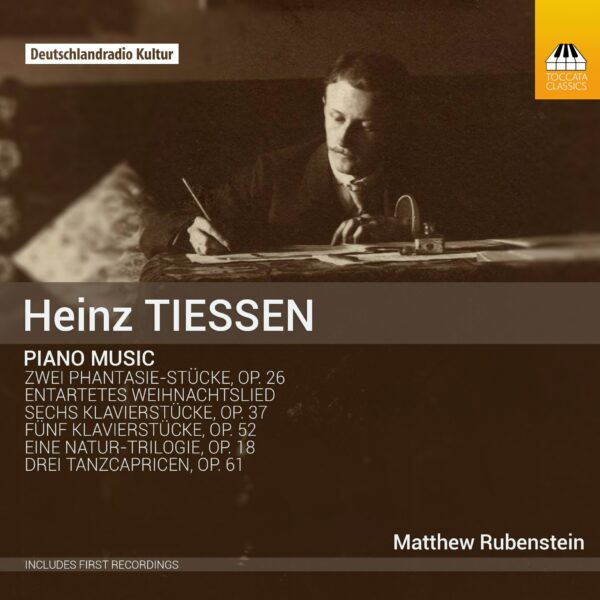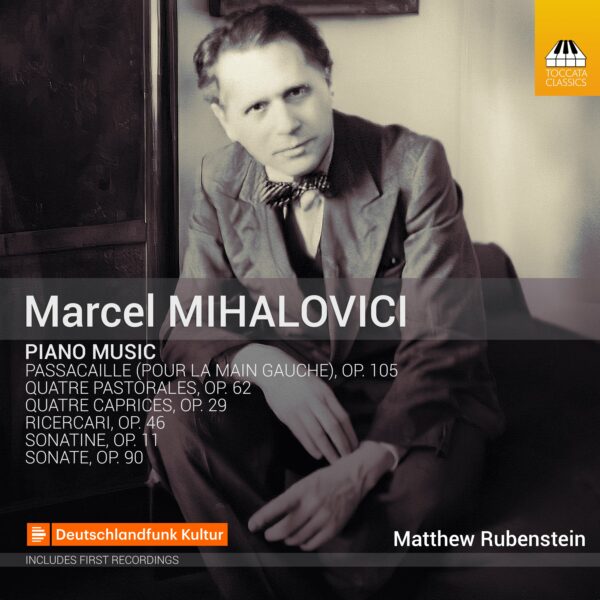Heinz Tiessen: Piano Music
Although Heinz Tiessen (1887–1971) was one of the most prominent composers of the Weimar Republic, his music has largely been lost from sight. This first-ever survey of his most important piano works include Eine Natur-Trilogie, a substantial three-part symphonic poem for piano, and a number of shorter works. Together they show Tiessen’s ability to combine a variety of styles – neo-Baroque counterpoint, Straussian textural opulence, Schoenbergian expressionism and Hindemithian clarity – in a personal language that is generous in its gestures and direct in its appeal.
Matthew Rubenstein, piano
Listen To This Recording:
-
Eine Natur-Trilogie, Op. 18:
- I Einsamkeit
- II Barcarole
- III Notturno tempestoso
- No. 1 Erinnerung
- No. 2 Florestan
- No. 1 Allegro
- No. 2 Adagio
- No. 3 Fughetta
- No. 4 Scherzino
- No. 5 Improvisation
- No. 6 Foxtrott
- No. 1 Improvisation
- No. 2 Zueignung
- No. 3 Scherzino fugato
- No. 4 Notturno
- No. 5 Allegro ritmico
- No. 1 Tanz bei Amsels
- No. 2 Papillon
- No. 3 Foxtrott
- Entartetes Weihnachtslied
Zwei Phantasie-Stucke, Op. 26:
Sechs Klavierstucke, Op. 37:
Funf Klavierstucke, Op. 52:
Drei Tanzcapricen, Op. 61:


Fanfare Magazine :
‘It is the music of late Liszt that seeps through the score of Eine Natur-Trilogie (1913), Tiessen’s most successful score in terms of reception. Anyone already hypnotized by Liszt’s experiments will find plenty to be fascinated by in the first movement, “Einsamkeit” (Richard Strauss lovers also will find plenty of influence), while the ensuing “Barcarole” is fascinating not only because it diverges from this towards Tiessen’s version of Impressionism (it is far gentler of harmony), but also because, to this listener’s ears at least, it seems to strive to return to the Lisztian cradle. There is also a decidedly post-Chopin bent to some of the textures and gestures. The result is a fascinating mélange that nevertheless exudes originality, not least because of the unexpected twists Tiessen adds to melodies. … What is so striking about Matthew Rubenstein’s performance is his grasp of the differing interpretative demands of each of the three parts of Eine Natur-Trilogie, an understanding he conveys via his textural as well as structural grasp. … yet Rubinstein honors the lighter textures of the central panel to perfection. One almost hears Scriabin-like half-lights. … As a set, op. 52 is a miracle of concision, and Rubenstein persuades the listener this is a perfect performance. … This is a terrific disc, then. Presentation could not be bettered; the recording (Berlin’s Jesus-Christus-Kirche, produced by Stefan Lang and engineered by Boris Hofmann) is top rank. Matthew Rubenstein is a highly technically equipped musician of sterling musicality. The excellent Toccata Classics offers not just an educational experience, but a beautifully moving musical one, too.’
—Colin Clarke, Fanfare, May/June 2016
MusicWeb International :
‘The package is completed with a long and thoughtful essay by Tobias Fasshauer. This provides an introduction and plenty of detail about the pieces. I wish it had also trailed more information about Tiessen’s other music.
These atmospherically performed and recorded pieces reveal a German composer with Gallic-Impressionistic sympathies. He was never a prisoner of tonality yet chose not to stray far from it either.’
—Rob Barnett, MusicWeb International
American Record Guide :
‘Toccata now does its bit to mitigate the neglect with this very-well-played and cleanly recorded survey of Tiessen’s piano works—all of them first recordings—stretching over three decades of his career.’
—Bradley Lehman, American Record Guide, March 2016